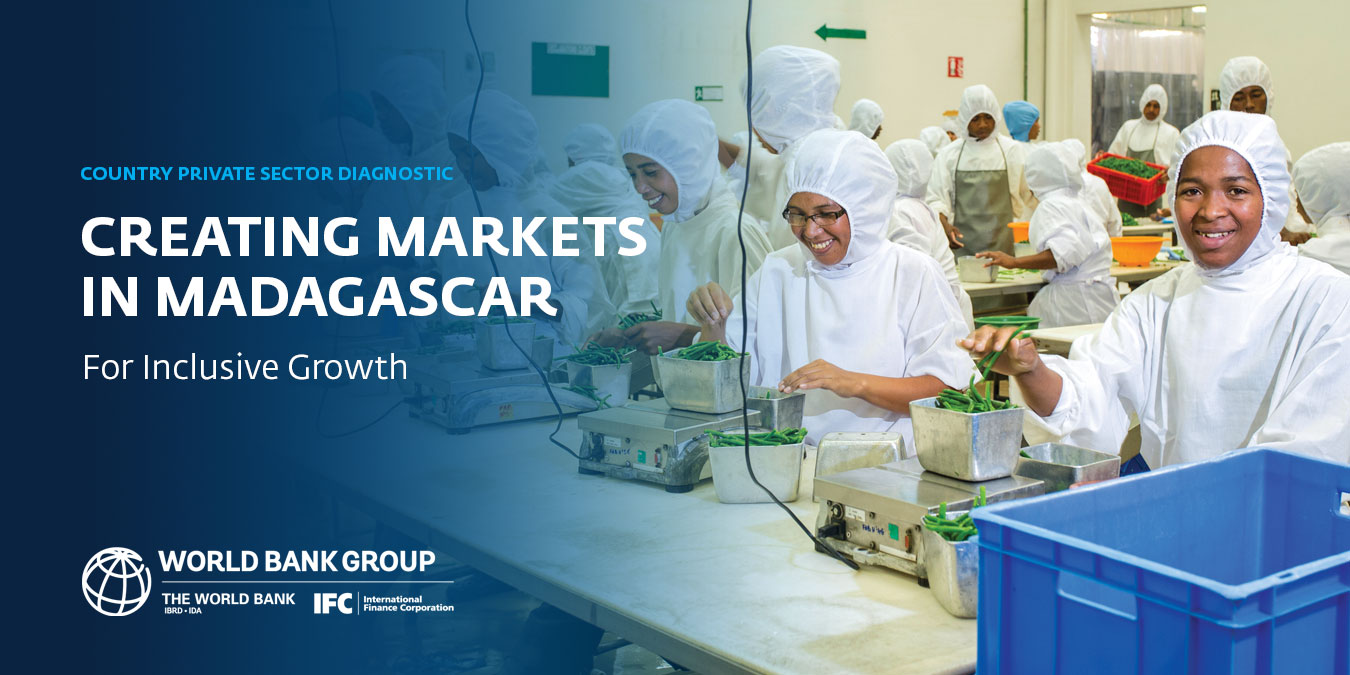
Antananarivo, Madagascar, December 7, 2021—Madagascar can create jobs, speed economic and fiscal recovery from COVID-19, and build a stronger future by introducing private sector reforms, improving the financial inclusion of smaller businesses, and strengthening competitiveness in key sectors, according to a World Bank Group report published today.
The Madagascar Country Private Sector Diagnostic (CPSD) report, prepared by the World Bank and IFC, highlights the need for Madagascar to strengthen its business environment and increase competitiveness to attract investment, including into its high-potential agribusiness, apparel, and tourism sectors.
The CPSD also outlines ways the country can alleviate constraints holding back productivity and investment in its energy, transport, and digital infrastructure sectors.
Madagascar suffered its first recession in a decade in the wake of the COVID-19 pandemic, which continues to threaten the country's growth and poverty-reduction efforts. The pandemic's impact on the Madagascar's informal sector and smaller businesses has been particularly severe.
"The COVID-19 crisis has been a blow to Madagascar's economy, but the country has great potential to get back on a growth trajectory and emerge stronger from the pandemic," said Marcelle Ayo, IFC's Country Manager for Madagascar. "Building a more robust private sector, attracting more investment and improving infrastructure and competitiveness will be critical to ensuring long-term and inclusive growth."
The CPSD suggests several specific interventions, including scaling up access to finance for smaller businesses, especially by leveraging digital financial services; establishing a more predictable business enabling environment; harmonizing the investment framework; improving the legal framework and zoning of dedicated land use to facilitate access to land; and strengthening institutional capacity for designing and implementing reforms.
"Madagascar, like other countries, has been hit hard by the COVID-19 shock. The CPSD is timely as it will inform the country and its development partners, including the WBG, on areas of focus to support economic recovery, job creation, and poverty reduction. Seizing the opportunities offered by the digital economy is smart economics, including in the informal sector to which many entrepreneurs, women, and the rural population belong," said Marie-Chantal Uwanyiligira, World Bank Country Manager for Madagascar.
The report is in line with measures planned under Madagascar's country development vision, the Plan Emergence Madagascar, which in its December 2021 draft form features a strong focus on private sector development, entrepreneurship, and improving competitiveness in global value chains.
IFC's strategy in Madagascar is aligned with the World Bank Group's fiscal year 2017-2021 Country Partnership Framework (CPF) for Madagascar. The CPF supports Madagascar's efforts to increase the resilience of its most vulnerable people, promote inclusive growth, mobilize private investment for development, and strengthen national and local institutions to reduce fragility. Since 2005, IFC has committed roughly $287 million in Madagascar, including mobilization from other investors.
About the Country Private Sector Diagnostic (CPSD).
Launched in 2017 as a corporate priority, World Bank Group's Country Private Sector Diagnostics support the institution's strategic focus on expanding private investment and leveraging private solutions to address development challenges in client countries. The diagnostics assess critical constraints to private sector engagement and identify policy and regulatory reforms needed to unleash private sector growth. They are jointly delivered by the World Bank and IFC. For more information, visit www.ifc.org/cpsd.
About IFC
IFC—a member of the World Bank Group—is the largest global development institution focused on the private sector in emerging markets. We work in more than 100 countries, using our capital, expertise, and influence to create markets and opportunities in developing countries. In fiscal year 2021, IFC committed a record $31.5 billion to private companies and financial institutions in developing countries, leveraging the power of the private sector to end extreme poverty and boost shared prosperity as economies grapple with the impacts of the COVID-19 pandemic. For more information, visit www.ifc.org.
About the World Bank Group
The World Bank Group plays a key role in the global effort to end extreme poverty and boost shared prosperity. It consists of five institutions: the World Bank, including the International Bank for Reconstruction and Development (IBRD) and the International Development Association (IDA); the International Finance Corporation (IFC); the Multilateral Investment Guarantee Agency (MIGA); and the International Centre for Settlement of Investment Disputes (ICSID). Working together in more than 100 countries, these institutions provide financing, advice, and other solutions that enable countries to address the most urgent challenges of development. For more information, please visit www.worldbank.org, www.miga.org, and www.ifc.org.
Stay Connected
www.facebook.com/IFCwbg
www.twitter.com/IFC_org
www.youtube.com/IFCvideocasts
www.ifc.org/SocialMediaIndex
Contacts
Stay Informed
Sign up to have customizable news & updates sent to you.